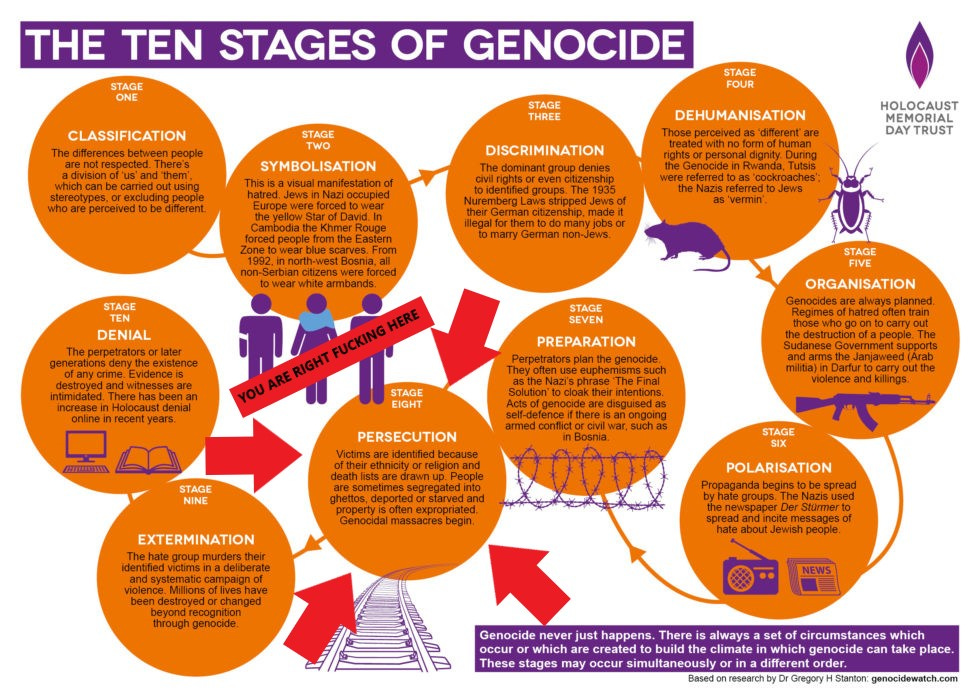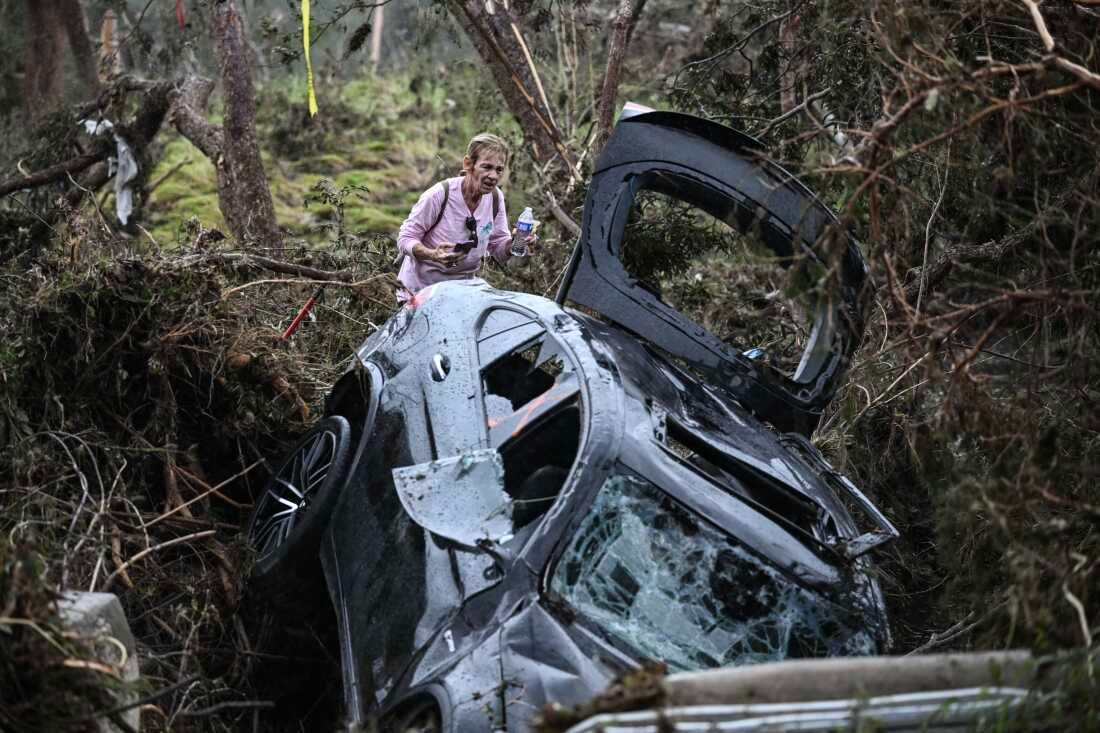This is it. This is Germany in the 1930s and what you do will be recorded in the history books. Your children and grandchildren will look back and ask what you did. Will you be able to look them in the face?
Last week, as Republicans yucked it up over their MAGA Murder Budget that will result in tens of thousands of Americans dying from lack of healthcare and homelessness and malnutrition and and and, they were also slapping themselves on the back over opening a concentration camp on American soil.
They gave it a cutesy little nickname. They blasted it all over the news and social media. They’re selling merch. It’s the most obvious propaganda campaign imaginable to normalize something we burned half of Europe to the ground to stop: A literal concentration camp meant for mass murder.
Fascism thrives on fear. It wilts under scrutiny. Never look away. Never stop fighting. Hold them accountable and make them pay for every cruel thing they do. It’s the only way we get through this. Support this newsletter for just $5 a month or $50 a year and we’ll get through together.
How do we know this is what the regime is planning? Professional monster Laura Loomer jumped the gun and skipped ahead a few steps in the PR strategy:
Hahahaha! It’s just jokes, though, right? That’s just Loomer being Loomer! She’s cray-cray! Ignore her! Lulz! Why are you libtards always so uptight? It’s just a joke!
It’s always “just a joke” with the right, though, isn’t it? It’s always “locker room talk” and “boys will be boys.” Republicans never mean what they say! It’s just rhetoric! It’s just “jokes.” But then they do exactly what they said they were going to do and everyone is shocked SHOCKED that they weren’t kidding at all.
Because it’s never “just a joke.” Especially when it comes to genocide.
There’s a panel from an X-Men comic, “Years of Future Past,” set in a dystopian alternate future. There, who is allowed to have children is strictly controlled in order to weed out “undesirables.” In this panel, the character Colossus explains to two teens how it always begins with “a joke.”
The Trump regime started its purge of non-whites by claiming to target “the worst of the worst.” Murderers. Rapists. Gang members. That lasted weeks if not days.
Then they started to arrest “anti-Semites” who threatened “national security” by “supporting terrorism.” Curiously, in this context that appears to have meant “protesting Israel while brown.”
The arrests quietly expanded to any undocumented migrants with even minor infractions on their record. Then none at all. Then the regime moved on to legal residents who had a criminal background of any kind. Drunk driving 30 years ago was a sufficient excuse.
Now the regime is seeking to strip naturalized citizens of their citizenship. First it will be people who engaged in fraud to become a citizen. But within months, or probably weeks, the regime will be trying to strip citizenship from any naturalized citizen for crimes they committed after becoming an American.
Because, you see, the regime does not see them as “real” Americans. And once that becomes a perfectly routine thing to do, why not strip citizenship from people born here if they’re a “danger to national security?”
And who will qualify as a “danger?” Exactly as Colossus says: Whoever they want.
The sick because they drain our resources
The homeless because they spread disease
The mentally ill because they’re “dangerous”
The handicapped and autistic because they can’t “pay taxes”
Democrats because they’re “anti-American”
Activists because they’re “terrorists
Intellectuals because they “spread lies”
Homosexuals because they’re “pedophiles”
Journalists
Muslims
Native Americans - The right has always hated Native Americans
Chinese
Of course, Jews. Always the Jews.
Loomer was “just joking” but she told us what the right wants. They want a white America. They want an America purged of all of the things Fox News tells them to hate. And that’s all of us. That’s more than half of the nation and you cannot “deport” that many people. The only way to remove them is through mass extermination.
That’s what Loomer is talking about. That’s what the concentration camps are for. That’s what they are planning.
Here’s a handy chart explaining the ten stages of genocide with an additional helpful bit inserted to highlight where we are. I’m sure you’ll figure out which part I added:
The jokes to normalize the mass murders have started. It’s really important to understand this for what it is. These jokes are meant to introduce the idea and condition us to it. Then normalize it, then make opposing it abnormal. At that point, it would be “rude” to speak out.
Did you know the Opinionated Ogre has a weekly podcast? It’s true! New episodes every Thursday! Catch the latest episode here:
Pay attention to who scolds us the loudest for raking the regime over the coals for “jokes” like this. Those will be the same people denying it ever happened a decade from now. Smile at them, tell them to fuck off, and put them in the column with the other collaborators. This is the time to make everyone profoundly uncomfortable about what is happening. The harder people work to “get back to normal,” the louder we have to be to disrupt that.
No one gets to say “I didn’t know.”
Now, here’s the important bit: Document everything. If you find out what company is supplying the concentration camps, document it. If you find out the name of a guard, document it. If find out that Google Earth is deleting pictures of the mass graves, document it. Document everything.
When the regime falls, and it WILL fall, every single person who helped the coming atrocities occur will be held accountable. The rapes, the murders, the illegal medical experiments, the child trafficking, the mass executions, all of it. The legacy press will spill more ink than the regime will spill blood to make it all go away. They are as allergic to accountability for racist white men as incels are to taking a shower and not asking women online to send naked pictures.
That cannot be allowed. They all have to be arrested, tried, and then enjoy their last meal before swinging from the gallows for what they’ve done. Live the Nazi life, die a Nazi death. This has not been a controversial idea in America for over 80 years, don’t fucking tell me I’m suddenly an extremist because the GOP has embraced genocide and fascism. We execute mass murderers and smile while we do it. It’s an American tradition I’ll be proud to uphold.
Do is it sound like I’m fucking joking to you?
I hope you feel better informed about the world and ready to kick fascists in the teeth to protect it. This newsletter exists because of you, so please consider becoming a supporting subscriber today for only $5 a month or just $50 a year. Thank you for everything!
Fascism hates organized protests. They fear the public. They fear US. Make fascists afraid again by joining Indivisible or 50501 and show them whose fucking country this is!
The Blue Wave has begun and the fascist fucks are scared. There are 119 days until it hits Virginia and Pennsylvania. If I were a billionaire fascist loser, I’d think REALLY hard about getting out of the way.









